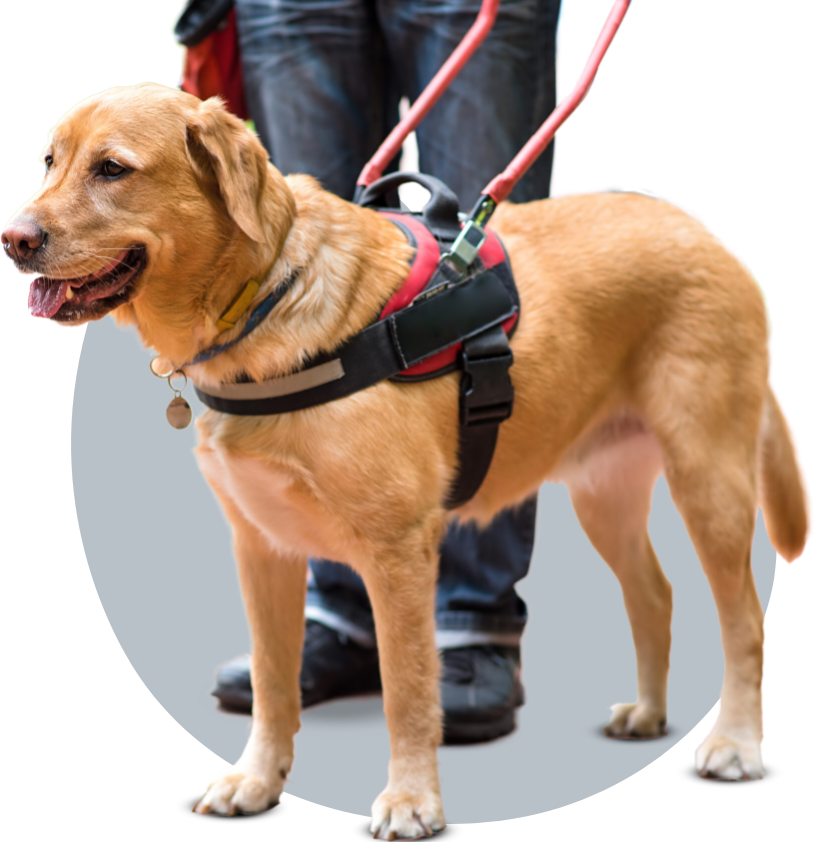The Impact of Service Dogs on Depression: A Comprehensive Analysis

Service Dogs and Depression
Depression is a pervasive mental health condition that affects millions of individuals in the United States. While traditional therapeutic approaches are effective, the complementary use of service dogs as emotional support animals has garnered increasing attention in recent years. This article aims to provide an in-depth examination of the role of service dogs in enhancing the mental well-being of individuals with depression. By analyzing a mix of recent and historical studies, we will uncover the benefits of service dogs in mitigating the symptoms of depression, along with the tasks they are trained to perform to support those struggling with this condition.
The Bond between Humans and Service Dogs
The unique bond between humans and dogs is deeply rooted in history. Since ancient times, humans have recognized the therapeutic effects of canine companionship. Service dogs, specially trained to provide emotional support, forge an unparalleled emotional connection with their handlers. This bond forms the foundation for the positive impact these animals have on mental well-being.
Benefits of Service Dogs for Depression
One of the primary benefits of service dogs for individuals with depression is their ability to alleviate feelings of loneliness and isolation. The constant companionship and unconditional love they provide can significantly reduce the sense of detachment experienced by those grappling with depression.
Service dogs also play a crucial role in easing anxiety and promoting relaxation. Their calming presence can help individuals manage stress and reduce anxiety levels. The tactile comfort of petting a dog has been shown to release oxytocin, a hormone associated with feelings of bonding and happiness.
In addition to emotional support, service dogs are adept at boosting mood and improving the overall emotional state of their handlers. Engaging in activities with these animals, such as playing fetch or going for walks, can release endorphins and serotonin, neurotransmitters known for their mood-enhancing effects.
Tasks and Training for Depression Mitigation
Service dogs are trained to perform various tasks that cater to the specific needs of individuals with depression. Their training is tailored to recognize and respond to the distinct symptoms that manifest in different ways for each person. Some of the specific tasks that service dogs are trained to perform to mitigate the symptoms of depression include:
1. Interrupting Negative Thought Patterns: Service dogs are trained to recognize signs of distress or agitation in their handlers. When they observe signs of negative thought patterns, such as repetitive negative thinking or rumination, they can interrupt these patterns by nudging, pawing, or performing other gentle physical cues. This redirection helps individuals focus on the present moment and break free from harmful thought cycles.
2. Providing Deep Pressure Therapy: During depressive episodes, individuals may experience heightened anxiety and physical tension. Service dogs can be trained to apply deep pressure therapy by leaning against or lying on their handlers. This pressure provides a calming effect, reducing anxiety levels and promoting relaxation.
3. Encouraging Physical Activity: Depression often saps individuals’ motivation to engage in physical activities. Service dogs can act as encouraging companions, motivating their handlers to go for walks or engage in playful activities. Regular exercise, facilitated by the presence of service dogs, can release endorphins, which help improve mood and overall emotional well-being.
4. Sensing and Responding to Emotional Changes: Service dogs have an extraordinary ability to sense changes in their handler’s emotional state. They can pick up on subtle cues like increased heart rate or changes in breathing patterns. When a handler displays signs of distress or sadness, the service dog responds with comforting behaviors, such as leaning in for a hug or providing gentle cuddles.
5. Offering Social Support: Depression can lead to social isolation and withdrawal from others. Service dogs act as social facilitators, breaking down barriers and encouraging interaction with others. Their presence often sparks conversations and fosters connections, helping individuals with depression feel less isolated and more engaged in social settings.
6. Navigating Public Spaces: Service dogs are trained to assist their handlers in navigating various public spaces. In environments that might trigger anxiety or discomfort, the dog can lead the way, providing a sense of security and support. This allows individuals with depression to feel more confident and capable while outside their familiar surroundings.

Empirical Evidence and Research Findings
Recent scientific studies have yielded promising results regarding the impact of service dogs on depression. These studies indicate that the presence of a service dog is associated with reduced symptoms of depression and increased overall well-being. The companionship and support provided by these animals have been shown to complement traditional therapeutic interventions, resulting in improved treatment outcomes.
Historical case studies also provide valuable insights into the long-standing use of service dogs for emotional support. Documented experiences demonstrate the enduring positive effects that these animals have had on individuals battling depression throughout history.
Challenges and Considerations
While the benefits of service dogs for depression are evident, challenges remain in making these support animals more accessible to those in need. Issues such as the cost of training and obtaining a service dog can pose significant barriers for many individuals.
Additionally, there is a need to dispel misconceptions and reduce stigma surrounding the use of service dogs for mental health support. Public awareness and education can play a crucial role in fostering acceptance and understanding of the benefits these animals provide.
The Future of Service Dogs in Mental Health Care
As research in the field of animal-assisted therapy continues to evolve, the role of service dogs in mental health care is likely to expand further. Collaboration between mental health professionals and service dog organizations can lead to innovative approaches and best practices in utilizing these animals to support individuals with depression.
Conclusion
The research and studies discussed in this article reinforce the positive impact of service dogs on the mental well-being of individuals with depression. From mitigating feelings of loneliness to providing emotional support during difficult times, service dogs offer a unique and invaluable contribution to mental health care. As our understanding of the human-animal bond grows, so does the potential for service dogs to play an increasingly significant role in enhancing the lives of those affected by depression in the United States and beyond.
One valuable resource for individuals seeking to utilize the support of service dogs is the National Service Animal Registry (NSAR). Registering with the NSAR can provide official recognition of a service dog’s role in supporting mental health. While registration is not mandatory, it can offer various benefits, including easier access to public places and housing that may have pet restrictions. However, it is essential to ensure that service dogs are adequately trained and meet the necessary requirements to fulfill their role effectively.
In conclusion, the continued research and development of service dog programs, along with increased public awareness, hold the potential to create a more inclusive and supportive environment for individuals with depression. As the bond between humans and service dogs deepens, these remarkable animals will undoubtedly continue to make a positive impact on mental well-being, offering hope and healing to those in need.














































































